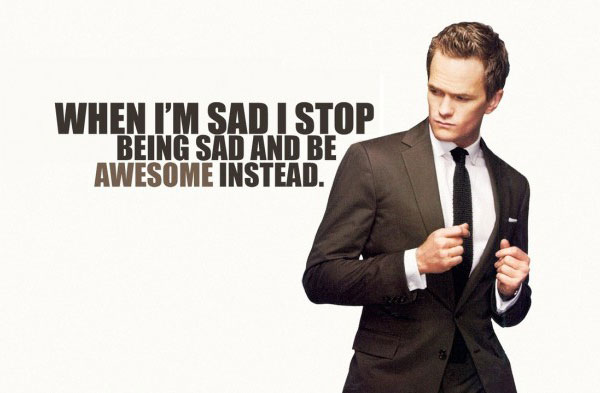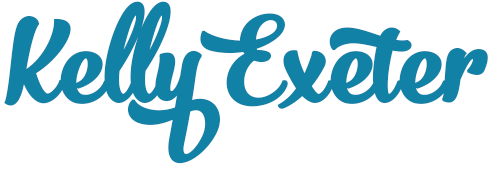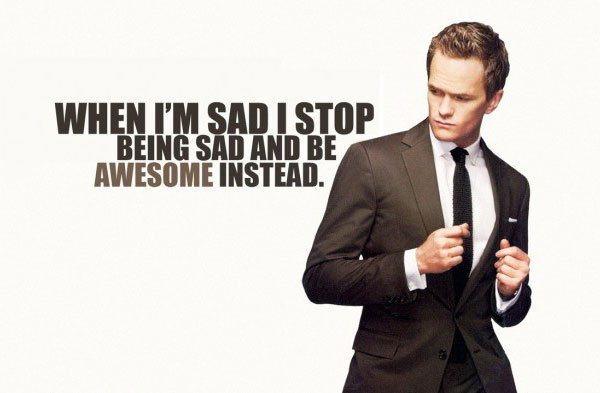
Post-Natal Depression (PND) is a sneaky little bastard. Because most of its symptoms line up neatly with those of extreme tiredness, it’s easy to see why many new mums take several months to seek help for it. Or only figure out they had it years after the fact.
It took me a solid two months.
Like many others before me, I initially blamed tiredness for a complete inability to cope with the daily challenges of life. But then Mia started sleeping through the night and suddenly that reason evaporated.
So then I blamed a lack of endorphins. But after two weeks of daily exercise there was no change. I was still constantly withdrawn and bursting into tears at the drop of a hat.
Then I decided it was because I was not cut out to spend all day, every day home with a baby. Luckily I had saved up for this very situation so I got myself a nanny. But even with that extra help I was still struggling.
So I decided to revert to my most tried and true coping mechanism.
Yes that’s right, I turned up the ‘awesome’.
If someone needed help, my hand flew into the air. If I had two days to do something, I did it in one hour. Our house was spotless. Our bills were paid. Emails had never been answered so fast. I even did all our Christmas shopping … in June. The worse I felt, the more frantically I went in search of gold stars. I obsessively chased the words ‘I have no idea how you are doing all of this with a newborn.’
To my great surprise, turning up the awesome didn’t actually help.
And while I was busy being awesome for the rest of the world, I was being quite sucky to my nearest and dearest. I had zero patience for the natural exuberance of my Mr 4 and the child who’d never been yelled at in his whole life suddenly found that a daily part of his life. As for Ant, all he could do was tiptoe around a wife who seemed permanently a hair trigger away from spewing forth a veritable fountain of negativity.
Ironically it took a giant fight with Ant for it to actually click in my head that I might have PND. (Isn’t it funny how you need someone to insensitively say ‘what the hell is going on with you’ for you to admit that ‘something might actually be wrong’. Only a husband could get away with that.)
Even so, my stubborn brain still resisted the concept.
My personal brand is all about having my shit together. Surely that offers a level of immunity?
I have all the help and support one person could ask for – surely I have no right to have PND?
Well no. I have since learned that PND doesn’t care how awesomely organised you are, how much help you have or how much you usually have your shit together.
Here’s what else I have learned about PND:
1. Your doctor will not roll his eyes at you for self-diagnosing with it.
Instead he will gently run you through a check-list of various things, confirm that yes, this is what you have, and then work out a management plan for you.
2. Being able to give the problem a name helps a LOT.
It gives you back a level of control and makes you feel like you are working towards a solution. This makes the bad days a bit easier to take … because you’ve eliminated that total sense of helplessness.
3. Telling other people helps a LOT.
As with any kind of mental illness, there is an inherent sense of shame. And it’s tempting to battle through it quietly on your own. But I found that the more people I told, the more I felt supported and the better I felt. So when people asked me ‘how’s everything going’ I stopped saying ‘great thanks,’ and started admitting that I was really struggling, but had sought help and things were slowly getting better.
4. Asking for help, helps a LOT.
Repeat after me: ‘Most people can’t read minds’. Come to think of it, I don’t know anyone who does. So instead of throwing myself in bed at 8pm and expecting Ant to know that meant ‘Can you tidy everything up downstairs so that when I wake up in the morning I don’t have to be greeted by a bombsite’ … I actually told him. Telling people stuff instead of expecting them to read your mind sure eliminates a lot of frustration.
5. Reducing commitments helps. A LOT.
Once I had figured that yes, I did have PND, I stopped taking on new commitments. Over-committing to stuff means than when things go wrong, you find yourself screaming ‘I don’t have the time to deal with this shit!’ Reducing the time pressures on me made a big difference.
6. PND doesn’t affect how much you love your baby.
I will be the first to admit that I don’t have the same visceral connection with Mia that I had with Jaden (and I will happily blame PND for that). But that doesn’t mean I don’t love and adore her to absolute bits. I sure hope she likes kisses and cuddles because I smother her in them daily.
So am I ‘cured’? Who knows. And honestly, I am not sitting around waiting to feel ‘cured’. Just the fact that I am feeling ‘better’ is good enough for now.
Currently the good days outnumber the bad and both my sense of humour and natural resilience have returned. If ever there was a week worthy of a despair spiral, it was last week which was full of sickness, injury, broken cars and other stressful things. Yet I got to the end of it with a wry smile on my face.
That’s pretty significant progress that I am more than happy to take for now.

